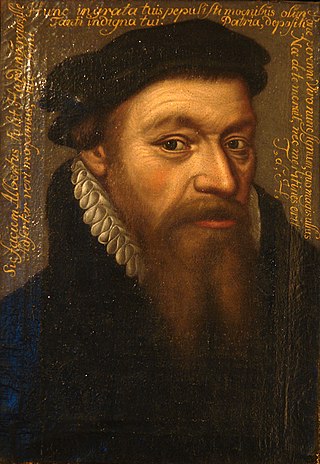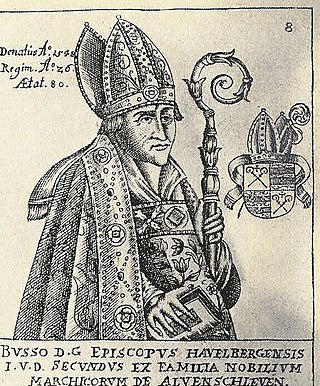Related Research Articles

Simon Dach was a German lyrical poet and hymnwriter, born in Memel, Duchy of Prussia.

TheodoreBibliander was a Swiss orientalist, publisher, Protestant reformer and linguist. Born Theodor Buchmann in Bischofszell, he studied Latin under Oswald Myconius, and Greek and Hebrew under Jakob Ceporin, and attended lectures in Basel between 1525–7 given by Johannes Oecolampadius and Konrad Pelikan. He also became familiar with the Arabic language and other languages from the East; he became a professor of theology. He published a Hebrew grammar in 1535, and commentaries on the Bible. Johannes Oporinus printed his edition of the Qur'an in Latin, which was based on the medieval translation of Robert of Ketton. The edition included the entire Toledan Collection, including Doctrina Machumet, a translation of the Arabic theological tract known as the Book of One Thousand Questions. Considered the father of biblical exegesis in Switzerland, Bibliander became involved in a doctrinal controversy with Pietro Martire Vermigli over predestination; he was removed from his theological professorship at the Carolinum academy in 1560. He died of the plague.
Godfrey II (965–1023), called the Childless, son of Godfrey I, Count of Verdun was the first of several members of his family to become duke of Lower Lorraine which roughly corresponded to modern Belgium and the Netherlands.

The (First) Battle of Vlaardingen was fought on 29 July 1018 between troops of the Holy Roman Empire and West Frisia. As a result of a trade dispute, Emperor Henry II sent an army towards West Frisia to subdue the rebellious Count Dirk III. However, the Imperial army was decisively defeated and fled in panic.
Adelmann was the bishop of Brescia, in Northern Italy, during the eleventh century. Adelmann seems to have become bishop there in 1050, and to have taken an active share in the church-reform movement of the period, especially against the clerical abuses of simony and concubinage.

Arbeoof Freising was an early medieval author and the Bishop of Freising from 764.

Christoph Helvig (1581–1617) was a German chronologist and historian, theologian and linguist.
Count Lambert "the Bearded" was the first person to be described as a count of Leuven in a surviving contemporary record, being described this way relatively late in life, in 1003. He is also the patrilineal ancestor of all the future counts of Leuven and dukes of Brabant until his descendant John III, Duke of Brabant, who died in 1355.
Bertram Otto Bardenhewer was a German Catholic patrologist. His Geschichte der altkirchlichen Literatur is a standard work, re-issued in 2008. For Bardenhewer, a patrologist was not a literary historian of the Church Fathers, but a historian of dogmatic definitions.

Gottfried Thomasius was a German Lutheran theologian. He was born in Egenhausen and he died in Erlangen.
Albert Heinrich Friedrich Stephan Ernst Louis Hauck was a German theologian and church historian.

Albert Hardenberg or Albertus Risaeus was a Reformed theologian and Protestant reformer, who was also active as a reformer in Cologne, Bremen and Emden.

Sigmund von Birken was a German poet of the Baroque. He was born in Wildstein, near Eger, and died in Nuremberg, aged 55.

Hans Backoffen was a German sculptor.
The Mainz Diocesan Feud, also known as the Baden-Palatine War, took place in 1461/1462 and was a warlike conflict for the throne of the Electorate of Mainz.
Adela of Hamaland, was countess of Hamaland in the Netherlands in about 973–1021. She was also the regent of Renkum in circa 983–?, likely as regent for her son Dirk of Renkum. Her claim on the inheritance of her father caused a conflict with her sister Liutgard of Elten, which lasted from 973 until 996. She first married Count Immed of Renkum, the father of her son, and later Count Balderik of Hamaland, whom she made her co-regent by marriage.
Gerhard of the Moselle, Count of Metz and possibly of Alsace, was a Lotharingian noble active in the early 11th century. He was a key figure within an alliance of Lotharingian nobles who were seen as opponents of Henry II, Holy Roman Emperor. This also put him in constant conflict with the king's loyal representatives in Lotharingia, his relatives in the family known to historians as the House of Ardenne–Verdun. Henry II was Gerhard's brother-in-law, as they had both married daughters of Count Sigfried, the ancestor of the counts of Luxembourg. He was also in the Ardenne dynasty, though his family came to be opposed to his Verdun cousins.
Count Balderic of Upladium was a Rhineland count in the Holy Roman Empire, who held various estates stretching from the forest region of Drenthe in the north, to the area near Cologne, on both sides of the river Rhine.

Busso X von Alvensleben was a Catholic ecclesiastical diplomat and from 1523 to 1548 as Busso II, the last Catholic Bishop of Havelberg.
References
- Hans van Rij, Sapir Abulafia (editors) (1980) Gebeurtenissen van deze tijd; Een fragment over bisschop Diederik I van Metz; De mirakelen van de heilige Walburg in Tiel.